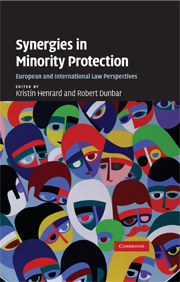Book contents
- Frontmatter
- Contents
- Foreword
- Abbreviations
- 1 Introduction
- PART A Minorities-specific instruments, provisions and institutions
- PART B Non-minorities-specific instruments, provisions and institutions
- 7 Developments relating to minorities in the law on genocide
- 8 The United Nations International Covenant on Economic, Social and Cultural Rights
- 9 The United Nations International Convention on the Elimination of All Forms of Racial Discrimination
- 10 The United Nations Convention on the Rights of the Child and Children Belonging to Minority Groups
- 11 UNESCO's Convention Against Discrimination in Education
- 12 A patchwork of ‘successful’ and ‘missed’ synergies in the jurisprudence of the ECHR
- 13 The many faces of minority policy in the European Union
- 14 Developments under the African Charter on Human and Peoples' Rights relevant to Minorities
- 15 Regional cooperation and minority issues in the Asia-Pacific region
- Index
- References
10 - The United Nations Convention on the Rights of the Child and Children Belonging to Minority Groups
from PART B - Non-minorities-specific instruments, provisions and institutions
Published online by Cambridge University Press: 21 July 2009
- Frontmatter
- Contents
- Foreword
- Abbreviations
- 1 Introduction
- PART A Minorities-specific instruments, provisions and institutions
- PART B Non-minorities-specific instruments, provisions and institutions
- 7 Developments relating to minorities in the law on genocide
- 8 The United Nations International Covenant on Economic, Social and Cultural Rights
- 9 The United Nations International Convention on the Elimination of All Forms of Racial Discrimination
- 10 The United Nations Convention on the Rights of the Child and Children Belonging to Minority Groups
- 11 UNESCO's Convention Against Discrimination in Education
- 12 A patchwork of ‘successful’ and ‘missed’ synergies in the jurisprudence of the ECHR
- 13 The many faces of minority policy in the European Union
- 14 Developments under the African Charter on Human and Peoples' Rights relevant to Minorities
- 15 Regional cooperation and minority issues in the Asia-Pacific region
- Index
- References
Summary
Introduction
The United Nations Convention on the Rights of the Child (‘CRC’) is a very rich human rights treaty. It covers most of the traditional civil and political rights and economic, social and cultural rights tailored to the child as a person with evolving capacities and with full respect for the responsibilities, rights and duties of parents. In addition, the CRC contains various provisions for the protection of children from all forms of violence and abuse (Article 19), economic exploitation, (commercial) sexual exploitation, abduction, and sale or traffic (Article 32–39). Other articles provide for the protection of refugee children (Article 22) and of children with disabilities (Article 23).
The CRC is applicable to every human being below the age of eighteen years in the 193 states that ratified this Convention. They have committed themselves to respect and ensure the rights set forth in the CRC to each child within their jurisdiction without discrimination of any kind (Article 2). This means that children belonging to minorities have the right to the full enjoyment of the rights enshrined in the CRC. The CRC is not a minority-specific human rights instrument but it does contain some unique references to minority groups, in particular to indigenous children.
In this chapter, I shall present and discuss the monitoring activities of the CRC Committee charged with the task of examining the progress made by states parties in achieving the realisation of their obligations under the CRC, including the difficulties they are facing in this regard (Articles 43 and 44).
- Type
- Chapter
- Information
- Synergies in Minority ProtectionEuropean and International Law Perspectives, pp. 278 - 296Publisher: Cambridge University PressPrint publication year: 2009



